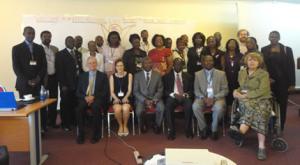Make patient safety a priority in Africa, patients urge
Entebbe, 22 March 2011 -- A group of patients, family members and advocates from Ethiopia, Ghana, Kenya, Malawi, Uganda and Zambia, joined health-care workers and policy-makers, in a workshop in Entebbe last week. Participants urged Member Sates and health-care providers to make patient safety a priority in Africa. This unique gathering organized by the WHO African Regional office gave participants the opportunity to share their experiences of harm in healthcare and passion for change to work together to improve health-care safety in their countries.
The workshop, held from 16 - 18 March in Uganda was the first of its kind in Africa. Participants will now join the existing network of Patients for Patient Safety (PFPS) Champions around the world. This network of patients, providers, policy makers and others advocate in the belief that patients and family members must be empowered and placed at the centre of care. PFPS believes sustainable improvements in safety will only be made if organizations engage patients' family members and civil society, to learn from medical error and to work in partnership to develop solutions in efforts to improve health-care safety.
PFPS Champion and advocate, Mrs. Robinah Kaitiritimba called on the group to work together and take action. She said: “…We have been waiting for this workshop. Now that we have a network we are going to move. We emerge from our time together with a shared passion to listen, learn and progressively improve patient safety in our countries…"
In 2008, the WHO African Regional Committee highlighted the problem of patient safety and endorsed a number of recommendations to facilitate improvement. One was to promote "…partnerships between patients, family members, health professionals and policy makers to effect meaningful change in patient safety..." The Committee also stressed that the involvement of patients in raising awareness and campaigning for the development and implementation of health-care safety measures, would be crucial if systems are to improve.
Medical errors result in many preventable injuries and deaths every year, and have been estimated to occur in 4% to 16% of all hospitalized patients. Although understanding of the extent of the problem is hampered by inadequate data, strengthening patient partnerships in Africa is of particular importance. Weak health-care delivery systems, including sub-optimal infrastructure, poor management capacity and under-equipped health facilities have brought about a situation where the likelihood of medical errors is high.
Prevalence studies on health care-associated infection from a number of African countries reported high infection rates (Mali 18.9%, Tanzania 14.8% and Algeria 9.8%) and that patients undergoing surgery were the most frequently affected. Inappropriate funding of health-care systems, unavailability of critical support systems including strategies, guidelines, tools and standards, remain major concerns in the African Region.
The WHO representative for Uganda, Dr Joaquim Saweka, officially opened the workshop by emphasizing the importance of addressing patient safety in the African Region. He welcomed the involvement of patients and civil society in these efforts.
The WHO focal point for patient safety in Uganda, Mr Joseph Mwoga, stressed that this network will "…bring the human face to all our work…" and envisions all stakeholders working more closely than ever before. He urged patients and patient organizations to take the initiative and share their powerful stories with health ministries and professional councils.
Dr Amandua Jacinto, Commissioner for Clinical Services, Ministry of Health Uganda, welcomed this "timely" workshop and stressed he is committed to engage with the new network, strengthening existing relationships with civil society to improve patient safety as a priority.
Patients and patient advocates worked hand in hand with policy makers and health-care workers to capture the spirit of the workshop by drafting a Declaration which calls for patient safety to be made a priority in Africa and for patients to be empowered as meaningful partners. Participants also developed action plans to improve reporting of medical errors, to prevent injuries and deaths due to infection, to raise awareness among patients and ensure their voices are heard, and to strengthen partnerships between patients and healthcare workers. The Entebbe Declaration will be finalized in the coming months.
Patients for Patient Safety, a core initiative within WHO Patient Safety, aims to ensure patients are engaged in all efforts to create safer health care. Patients for Patient Safety is an international network of over 200 patients and family members who have experienced preventable harm in the health-care system, as well as patient advocates, policy-makers, health-care workers and others, from all over the world, who are dedicated to improving patient safety through patient engagement and by working in partnership.
For more information, please contact:
Dr Pierre Claver KARIYO
Email: Kariyiop [at] zw.afro.who.int (Kariyiop[at]zw[dot]afro[dot]who[dot]int)
Tel: + 47241 38078
Mrs Anna Lee
Email: leea [at] who.int (leea[at]who[dot]int)
Tel: +44 207 927 9325.



